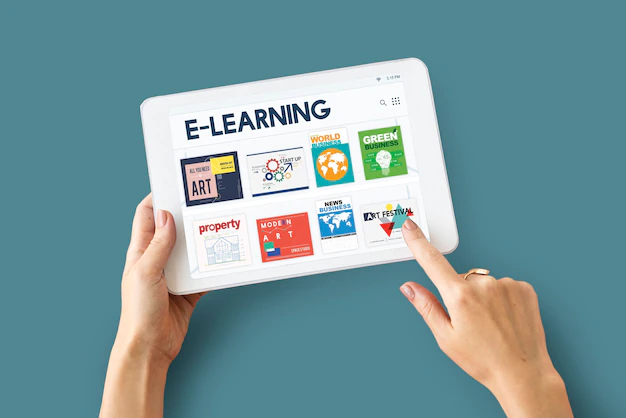The Power Of Generative AI In The eLearning Industry

Welcome to the new era of education where generative AI is changing how we learn. The evolution of learning has been amazing and this part makes it worth more.
This article will discuss how generative AI is being used in eLearning and how it is changing the way education works.
Using the power of generative AI, both teachers and students can access personalized and immersive learning experiences.
Get ready and hold on tight for an interesting adventure into the future of online learning.
Read: Leverage Generative AI In Learning and Development
How To Use Generative AI In eLearning
Enhancing of Content Creation
Envision getting to an unending library of instructive substance custom fitted to your needs. Generative AI makes this a reality. It enables teachers to make robotized substances for different subjects, sparing time and exertion.
Whether math issues, science tests, or chronicled reenactments, AI-generated substances can give a wealthy and assorted learning involvement. Moreover, generative AI empowers the customization of substances based on personal inclinations.
By analyzing learning designs and inclinations, AI calculations can clergyman personalized learning materials that cater to your interesting learning fashion, cultivating way better engagement and understanding.
Enhance Personal Learning Experience
AI calculations adjust to your qualities, shortcomings, and learning pace through versatile learning ways. This personalized approach guarantees you get the proper substance at the proper time, maximizing your learning potential.
Besides, AI-powered feedback and appraisal frameworks offer shrewd bits of knowledge into your advance. Rather than nonexclusive criticism, AI analyzes your execution in-depth, giving custom-made proposals and highlighting ranges for change.
This important criticism circle fills your development and empowers self-directed learning.
Processing Natural Language For Language Learning
Learning a modern dialect can be challenging, but generative AI is here to lend a helping hand. With AI-driven Common Dialect Handling (NLP), dialect learners can lock in in intelligently hone and conversational reenactments. These reenactments recreate real-life discussions, making a difference as you refine your dialect aptitudes and construct certainty in a steady virtual environment.
AI too offers programmed interpretation and translation administrations, breaking down dialect obstructions. Presently you’ll get to learning materials in your local dialect or investigate outside writings with ease. Also, AI-powered dialect capability appraisals give personalized mentoring based on your needs, guaranteeing fast advance.
Virtual Tutors And Mentors
In online learning, AI-powered mentors and tutors are becoming extremely important companions. Imagine having a computer program that can help you whenever you need it, day or night, by answering your questions and explaining difficult ideas to you. These computer programs give you quick help, making your learning better and improving how productive you are.
AI-powered tutoring systems are created to provide personalized assistance in a more advanced way. These smart systems analyze how you learn, find out where you have difficulty, and give you specific help. With virtual tutors, you can get help to overcome challenges, improve your understanding, and achieve your educational goals.
Insightful Learning Analytics
Information is very valuable in education, and AI helps us fully use it. By using AI technology, learning analytics can track and analyze your performance to provide useful information. These observations help teachers to find patterns, notice early signs of difficulties, and provide individualized support.
In addition, predictive analytics use past information to predict future results of learning. Teachers can help you if they see things that might get in the way of your success.
With the help of information and analysis, you can confidently navigate the world of education.
Generative AI Futurism in eLearning
Generative AI has huge possibilities in eLearning, and we have only just started exploring them. As technology gets better, we can expect more really important new ideas in education.
We might see the creation of AI-powered Virtual Reality (VR) and Augmented Reality (AR) experiences. These experiences will allow learners to be fully engaged in virtual surroundings to learn and practice hands-on.
AI algorithms might improve and adapt to different ways that people learn, making the educational experience more personalized for each individual.
Collaborative AI platforms can help people work together on projects in virtual classrooms. It makes it easier for them to interact and cooperate as a team.
However, as we explore the possibilities of generative AI, we need to be cautious and deal with the moral issues. We should focus on making AI development fair, transparent, and inclusive.
Ethical Challenges
As we use AI in eLearning, it’s important to think about ethics. We need to prioritize protecting students’ private information by keeping it safe and secure.
To make sure learning experiences are fair, it is important to have clear and fair AI algorithms. It is up to all of us to deal with unfairness and make sure everyone is included when creating and using AI technologies.
Conclusion
As a student, you can use new technology to have fun, personalized and interesting educational experiences. So, use AI to help you learn and reach your maximum potential in the digital age of education.
Let people working together with artificial intelligence make online learning better so that everyone can participate and benefit from it.







